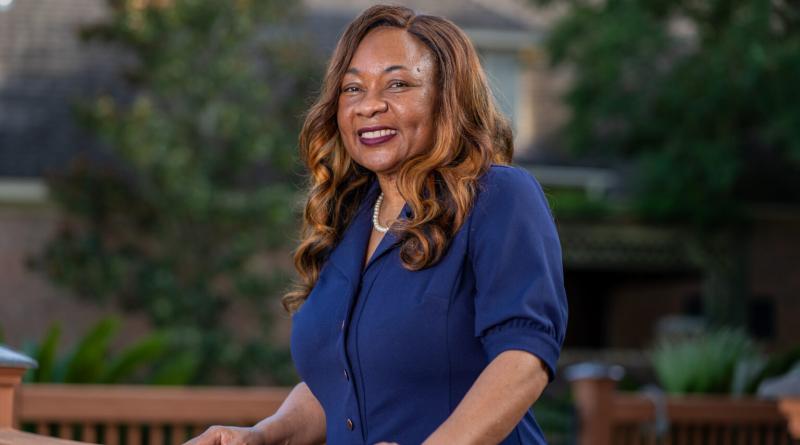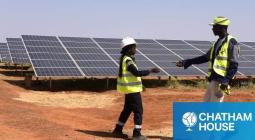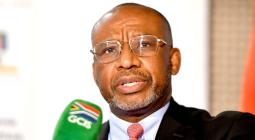Q&A: Catherine Coleman Flowers Talks COP28, Rural Alabama, and the Path Toward a ‘Just Transition’

Catherine Coleman Flowers brings Alabama’s Black Belt with her everywhere she goes. She can’t help it.
Flowers, founding director of the Center for Rural Enterprise and Environmental Justice, most recently brought the Black Belt to Dubai, attending the 2023 United Nations Climate Change Conference that wrapped up on Wednesday to advance her work advocating for environmental justice in rural communities.
Flowers grew up in Lowndes County, Alabama, one of more than a dozen counties that comprise the belt, a rural region named after its dark, fertile soil. There, and in rural communities across the U.S., Flowers has advocated for those suffering from environmental racism and rural disinvestment, working to call attention to issues often thought of as nonexistent in developed countries.
In 2017, Flowers invited Philip Alston, the U.N. special rapporteur on extreme poverty, to visit the rural region of Alabama during his U.S. tour. Alston honored the request. What he saw on the resulting trip, Alston said, was “uncommon in the first world.”
“In Alabama, I saw various houses in rural areas that were surrounded by cesspools of sewage that flowed out of broken or non-existent septic systems,” Alston wrote after the trip. “The State Health Department had no idea of how many households exist in these conditions, despite the grave health consequences. Nor did they have any plan to find out, or devise a plan to do something about it.”
The same year, researchers concluded that hookworm, thought to be eradicated in the U.S. decades ago, was still relatively common in at least one Black Belt community. The study had been Flowers’ idea.
Later named a MacArthur Fellow and one of TIME’s 100 most influential people of 2023, Flowers’ work has elevated the plight of rural Alabamians and those like them in ways that have caught the attention of policymakers. During the last presidential transition, Flowers served as the only Black member of Biden’s Unity Task Force on Climate Change. In 2021, she was named to the White House’s Environmental Justice Advisory Council.
Inside Climate News spoke with Flowers on Wednesday, just days after she’d returned to Alabama from Dubai.
When you ask Alabamians about what’s happening at COP, many are not familiar with what COP is. Folks have jobs. Folks are worried about paying the bills and aren’t necessarily paying attention to global climate policy. I wonder what you think about that disconnect.
People think more about climate policy than we know. People may not fully understand their role in how they can impact climate policy. Think of you living in a trailer. And there’s a warning that you have to get out of your trailer, because there’s a tornado.
That’s a kind of climate policy. We may not call it climate policy, but people do have the capacity to think about more than one thing at a time. And I believe coming from Lowndes County, Alabama, meeting the head of COP in Dubai, that’s saying a lot. I wasn’t given all the privileges of people that had money. I didn’t get a chance to go to the prestigious schools in the state of Alabama. But yet, I still have an understanding, because I grew up in a rural community.
I could see how things were changing. I didn’t know to call it climate change. I didn’t necessarily know the terms initially. But I knew something was different. I knew that the weather was changing. I knew that the storms were getting worse … I think the assumption is that people don’t know that people are ignorant of these things, but they’re not. I think the disconnect is that they don’t know what they can do about it.
Growing up I lived in trailers, and I can remember those tornado warnings. One of the things they would say is that if you’re not in a sturdy structure, a ditch might be a safer place to go. I remember wondering as a young child—are they really telling us to go to the ditch? What is happening?
Exactly. When I’m at COP, you know the types of things I talk about? I talk about: do we put solar panels on a mobile home? Just because I’m at COP, don’t mean that I don’t relate. That’s a role that I’ve been playing to get to sort of understand the perspective of folks. Most politicians that are there have never lived in a mobile home. They don’t know what it’s like. So what I do when I’m in those rooms … I’ve said to them, “We have to have a holistic view.” Climate justice also involves making sure that people have sturdy homes. That’s resilience, too, you know.
One reason that Alabama has one of the highest death rates during tornadoes is because of people living in mobile homes. And that’s directly related to climate change because things are shifting … I think what I tried to do is bridge the gap between the understanding of people in the rooms that I’m in and the understanding of the perspective of people that are living in rural communities, living in mobile homes. Poor people.
So that as we deal with this transformation, this big transition that we’re going to make away from fossil fuels to renewables, it has to be a holistic transformation and a just transition that will allow them to also be part of whatever prosperity comes from this.
You mentioned your function in trying to get folks at COP and global policymakers to better understand the experiences of people in rural communities in Alabama and in the U.S., generally. When you talk to folks at COP, for example, what are the issues where you think they may not have as full of an understanding as they need when it comes to those types of issues facing rural communities in the United States?
Someone always comes up to me and says “I’m glad that your perspective is here because we need people to know about it.” And then some come to me and say, “I grew up in a rural community, too.” Whether it’s in China, or whether it’s in a European country, or even an African or Asian nation.
So a lot of what I’ve described, I found out these are global issues. They’re not just issues we have in Alabama. And there are people who think that because of the image of the United States as being so wealthy—they don’t expect these kinds of issues to exist here. But they do exist here. They exist globally …
One young lady came up to me when I was at COP in Dubai. She’s from the Philippines. And she actually has invited me to come to the Philippines because a lot of the issues that I talk about are prevalent there, too. So being at these tables gives me the opportunity to elevate those issues in a way in which they haven’t seen from my perspective: the perspective of an African-American woman from a rural community in Alabama.
When you look at the issues facing rural folks in Alabama, what are the top issues on your radar that you think will be important to tackle in the coming months and years?
Wastewater is one: making sure people get resilient wastewater infrastructure. And I would like to see every family that has to live on a septic system receive a warranty of at least 10 years because septic systems are failing everywhere. I’ve been around the country and people are having the same problems they’re having in the Black Belt.
So you can’t blame it on people being poor and or people just not being educated or knowing how to manage the systems. We have to come up with another way to deal with the realities of rising sea levels. It means that the groundwater tables are rising and we’re getting more water from the sky, too, with more deluges of rain due to climate change. So we’re going to have to build more sustainable and resilient wastewater treatment systems. The people that are suffering the most are rural communities right now.
And then the second thing that I think is a concern is sustainable and resilient housing. People want to make sure that they don’t have to go to a ditch when there’s a tornado warning and there’s no shelters nearby.
People are concerned about energy and energy costs, and how they’re going to get access to this new electrification that people are talking about globally. Is it going to impact them? Is it ever going to touch their areas?
There’s also just the loss of talent. There are people concerned about communities dying because when young people leave and go to college, they don’t come back because there’s nothing for them to come back to.
So those are the kinds of concerns that have been raised. We just want to have sustainable investment in those areas that don’t exploit and extract.
You’ve mentioned the transition away from fossil fuels. When you talk to folks in rural communities, folks you’ve known your whole life, what kind of advice do you give them in terms of finding their place in this transition, and what they can do to participate in this transition and not feel like they’re being left behind?
That’s a conversation that generally takes place with the folk that want to go into those communities. Sure. And what I say to them is that you have to recognize and respect that the people that live in the local communities are the experts. Real community engagement means they’re seated at the table because they have solutions that they can provide that might work in those areas … We need to understand that the people in the community, the people that live in these rural communities that live there and thrive for years and survive for years—there’s something that they know about how to live there, and they also know what’s needed for them to be able to continue to live there.
So working together and respecting your knowledge instead of coming in and trying to tell them what to do. And instead of having meaningful community engagement, I think that’s the key … But I also say to local communities, make sure that you insist on community engagement to make sure your voice is heard.
Because of the work of folks like you and others, we’ve seen increased attention when it comes to Black Belt investment from the federal government. In Lowndes County, the Biden administration’s put some particular focus on addressing some of these issues. I wonder if you’re encouraged by that and if you’re worried in terms of the upcoming election when it comes to what could be in the future if there’s an administration change?
Well, I’m encouraged by it. I’m encouraged by it, and I think that any administration that may come after the Biden administration that does not address these problems in the Black Belt and across rural America—because these are problems across rural America—is doing a disservice to the United States. That’s my concern. I’ve been hearing from people from rural communities throughout the US. And it is because of what’s happening in Lowndes County that people feel comfortable now to talk about the fact that septic systems have failed in other places like California or Hawaii, places that I’ve visited this year. I’ve seen it firsthand.
I was raised in a small town in south Mobile County called Grand Bay, and until the time I graduated high school, we weren’t able to flush toilet paper in our house because of a failing septic tank. We were too poor to fix it. There are a lot of people who may not understand that’s still happening in Alabama.
The only way we’re going to change this is that we’ve got to have everybody speaking up about this. I did an event for Mobile Baykeepers and a lot of people were from Baldwin County, and they were talking about how they had sewage in their backyards.
And these were not disadvantaged people, but I think the image that people want to put out there is that these are all poor, Black people that are uneducated, and that’s why they have sewage in their backyards. But that’s not true … But there’s no reason for us not to find real, sustainable solutions. But I’m just concerned that we have a lot of ambulance chasers that are out there that have created this policy.
These are the same people that are trying now to position themselves to be in front of determining what happens. So we should have their warranties in place because without those warranties in place, it doesn’t protect them, no matter which administration’s in office. The money would be spent and people would still be dealing with the fact that they can’t flush their toilets… It’s a dynamic happening in so many places.
Somebody called me recently about what’s happening in Tuscaloosa in the Black community where the sewage system is failing. It’s running back into people’s homes It’s in their yards. I haven’t had the chance to go there yet. But hopefully, I’m gonna slow down with my travels, and I will be able to go and see this firsthand. So if you’re interested, maybe you can go and see it as well.





